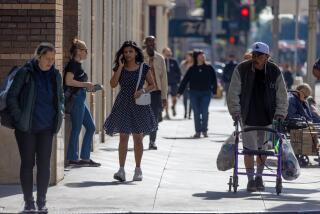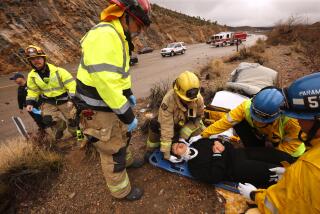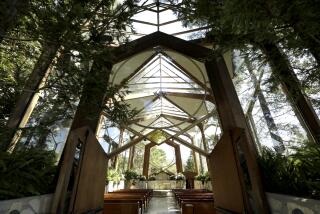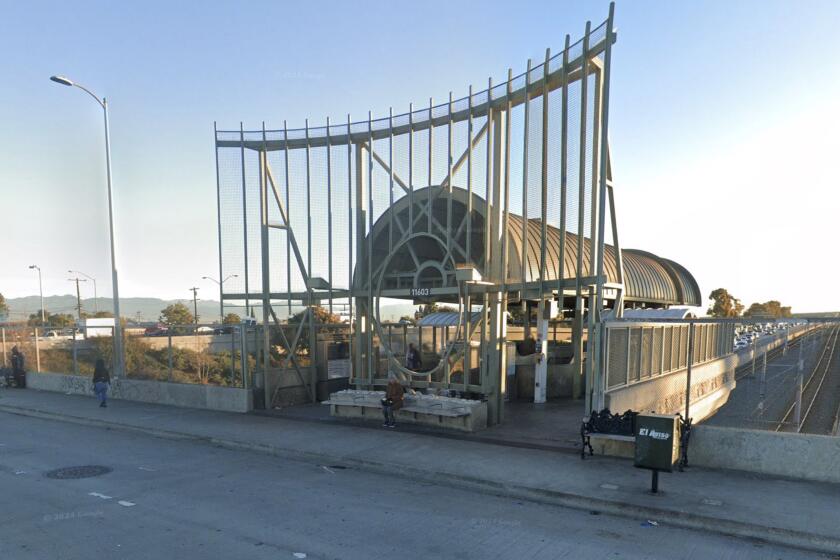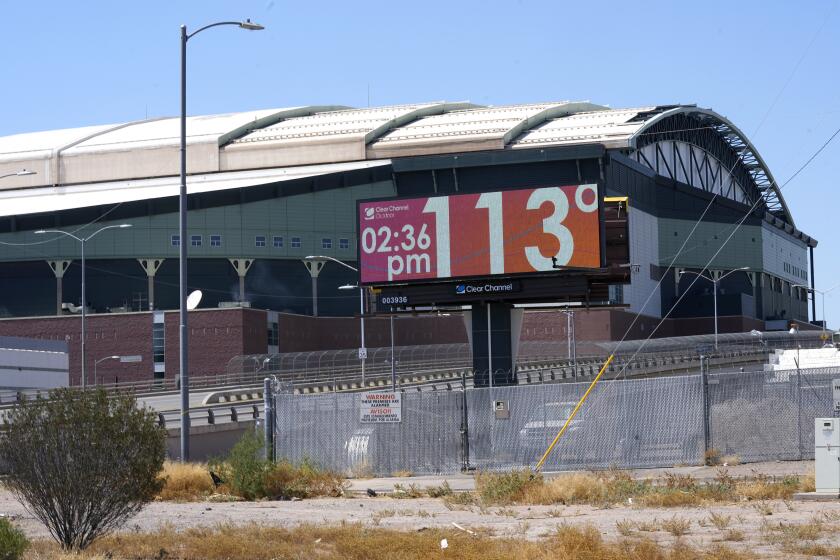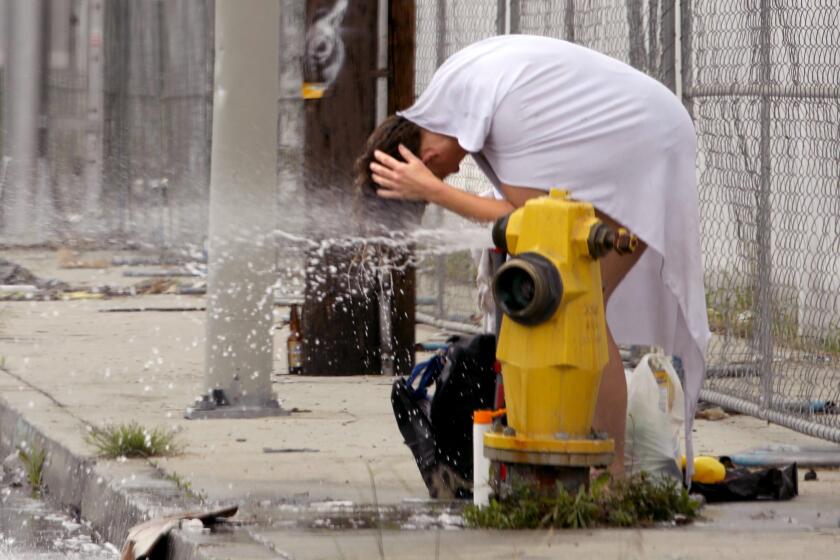ELECTIONS : Hillside, Depot Plans Are Top Council Issues : Politics: Eight candidates are competing for two open seats. Most stress fiscal conservatism.
This city’s ambitious plan to purchase hillside open space and a proposal to create a transportation center at the historic Santa Fe depot have emerged as major issues in the April 14 City Council election.
Eight candidates are competing for two council seats.
Councilwoman Judy Wright, partner in a firm that develops historic preservation plans, is seeking her third four-year term. Councilman Bill McCready, whose term expires next month, chose not to seek reelection to the five-member council.
Other candidates are Dennis D. Bauman, owner of a high-technology design firm; Corey Calaycay, a college senior; Edward V. Carey, retired general manager of a trucking company; Jack D. Mansfield, a retired businessman; Douglas O. McGoon, director of facilities at a retirement complex; Samuel L. Mowbray, scientist at a medical company, and Suzan Smith, a community volunteer.
Calaycay and Mansfield ran two years ago in campaigns that criticized the council for adopting a citywide tax assessment district for lighting and landscaping without submitting the issue to voters. Mansfield finished fifth and Calaycay sixth in the 10-candidate field.
Most of the candidates are stressing fiscal conservatism and have criticized the current council for its costly hillside preservation and depot restoration plans.
The city has spent $2 million in land options and development plans to preserve open space by buying 1,200 acres of hillside land from Padua Hills Management Corp. The city hopes to sell 125 acres of the parcel to a developer to recoup the entire $16.2-million purchase price, plus establish a $1-million maintenance fund.
The city spent $460,000 in 1989 to buy the Santa Fe depot on 1st Street and intends to spend $1.8 million more to develop a transportation center at the southern end of the Village, the city’s central business district. Plans call for the 1927 depot to be restored, with part of the building used as a lobby and ticket sales office and part as a restaurant. The depot would serve as a transportation center for trains, buses, taxis, commuter vans and other vehicles.
Incumbent Wright said the hillside and depot plans are “two very exciting projects” that will benefit the city. Though conceding that the city’s efforts to acquire hillside land entail financial risk, she said, “There’s a risk in not doing it too--the risk of losing open space.”
She said the restoration of the Santa Fe depot is necessary to give Claremont a stop on the commuter rail line from Los Angeles to San Bernardino. Although few riders may be served initially, she said, “if we miss out on the stop now, we’re never going to get one.”
Most of the seven challengers sharply disagree.
Bauman, 40, who was one of the leaders in the fight against the tax assessment district in 1990, said the council should have worked with the neighboring cities of Upland and La Verne on a regional strategy to preserve open space. “We could have worked it out without putting the city at risk,” Bauman said.
He said he also worries that the city would probably be saddled with the expensive restoration of the Padua Hills Theater, which is being acquired as part of the hillside project. He said the theater should be transferred to a private foundation so that taxpayers are not burdened. No performances have been staged at the theater for several years, but it is rented out to private parties.
Bauman said the Santa Fe depot would be better used as offices for the Chamber of Commerce, Claremont Heritage and the Claremont Community Foundation. He questioned spending transportation funds on a project that would benefit a private restaurant.
Calaycay, a 21-year-old student who expects to receive a degree in business administration from Loyola Marymount University in May, said his campaign is stressing the need for openness in government.
“The way they do things (at City Hall) is very deceiving,” Calaycay said. “They are not that straight-forward and honest,” he said.
An example, he said, is the use of transportation funds to restore the depot, the purpose of which, he contends, is actually historic preservation. Instead of spending money on the depot and the hillsides, he said, the city should concentrate on police, sanitation and other basic services.
Even harsher in his criticism, Mansfield, 70, who ran a manufacturing business for 25 years, said the city should abandon the hillside project, even if it must take a loss.
He said the city’s plans to restore the train depot are “camouflage to build a glorified hamburger stand.”
He said the city should leave vacant hillsides in the hands of Pomona College and other private owners instead of entering the real estate business. At the very least, he said, the hillside project should be submitted to voters.
Carey, 62, who owned an Orange Julius business on Foothill Boulevard for several years, said he wants to serve the city, which he praised for its “serenity, low crime rate and excellent city services.” But he also has faulted the city for not submitting the lighting and landscape assessment district to a vote two years ago, and he has questioned the financing of the depot and hillside preservation projects.
Two challengers who promote themselves as pro-business candidates criticize the council for actions they say have discouraged business.
Mowbray, 48, who has a Ph.D. in molecular biology from UCLA, said the city has been inhospitable to business. Cumbersome regulatory processes, overly restrictive controls on signs and an anti-business attitude, he said, have driven businesses away at a time when the city needs to encourage economic growth to bring in new revenue.
Mowbray also opposes the hillside purchase and depot restoration and thinks that the city should be fighting the planned extension of the Foothill Freeway (210) through the northern part of Claremont, which is “going to do great harm to the community,” he said.
Smith, 56, who has served eight years on the Planning Commission and four years on the Environmental Quality Commission, describes herself as “very pro-business” and said it is the council’s responsibility to retain existing businesses and attract new ones.
She said the city has lost its “sense of openness,” creating a gulf between the council and the community that she would seek to bridge.
One challenger has refrained from criticizing any current policies.
“I don’t have an agenda to change the city,” said McGoon, 40, director of facilities at the Mt. San Antonio Gardens retirement center and owner of a candy store in the Village. He also serves on the city Architectural Commission.
McGoon, who has an engineering degree, said the development of the Santa Fe depot into a transportation center should stimulate business in the Village, and the project to preserve the hillsides as open space “will turn out to be one of the best things the city has ever done.”
Incumbent Wright said that contrary to critics, “this council has been very friendly to business. . . . I don’t know of any business that has left town” because of overly restrictive regulations.
Wright, 52, cites as her accomplishments the city’s revamped trash recycling program, improved relations between the city and the college and business communities, and revival of the Claremont Auto Center and the shopping complex at Indian Hill Boulevard and Arrow Highway. Wright has worked to improve public transportation, serving on transit groups at the regional, state and national levels.
More to Read
Start your day right
Sign up for Essential California for news, features and recommendations from the L.A. Times and beyond in your inbox six days a week.
You may occasionally receive promotional content from the Los Angeles Times.
